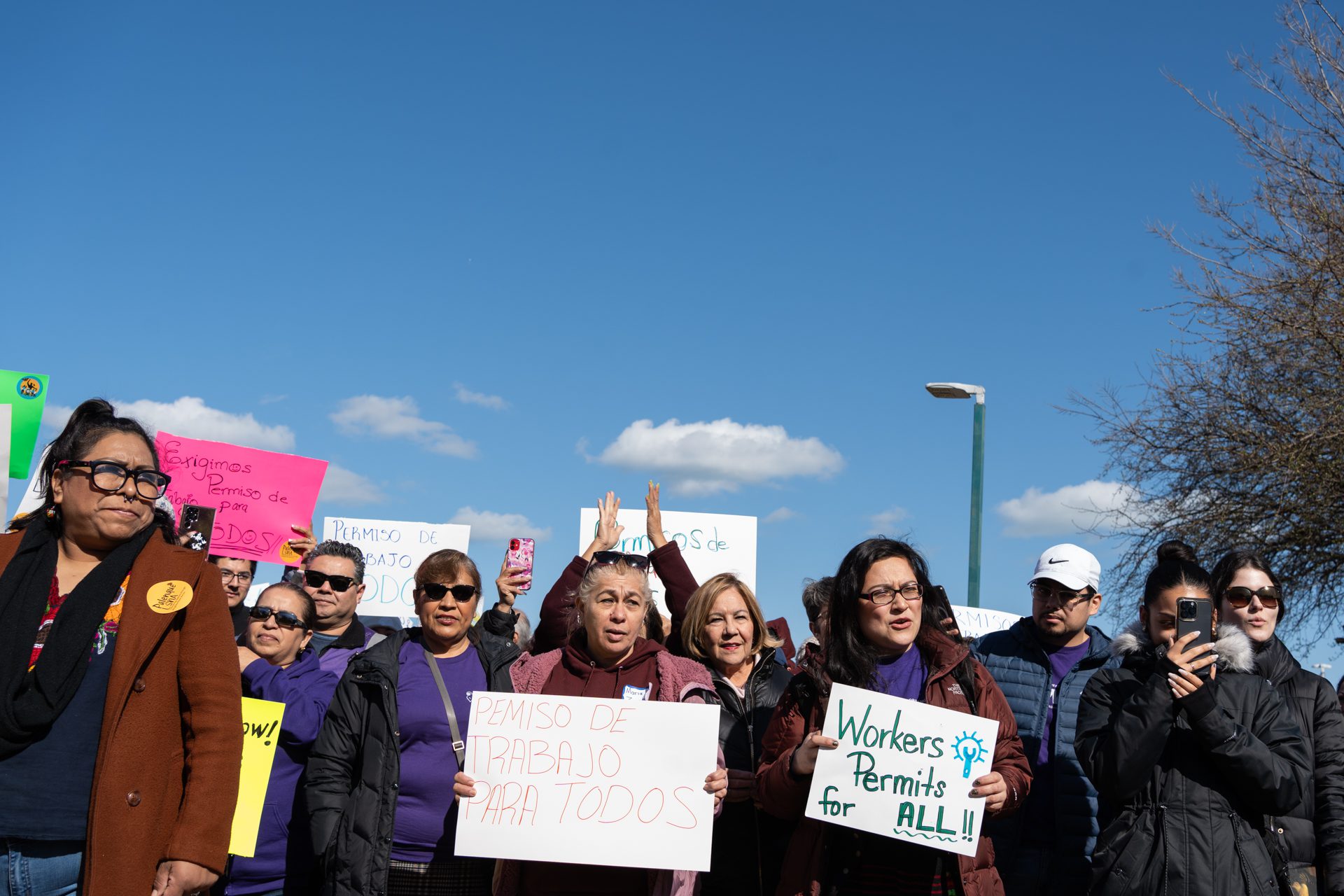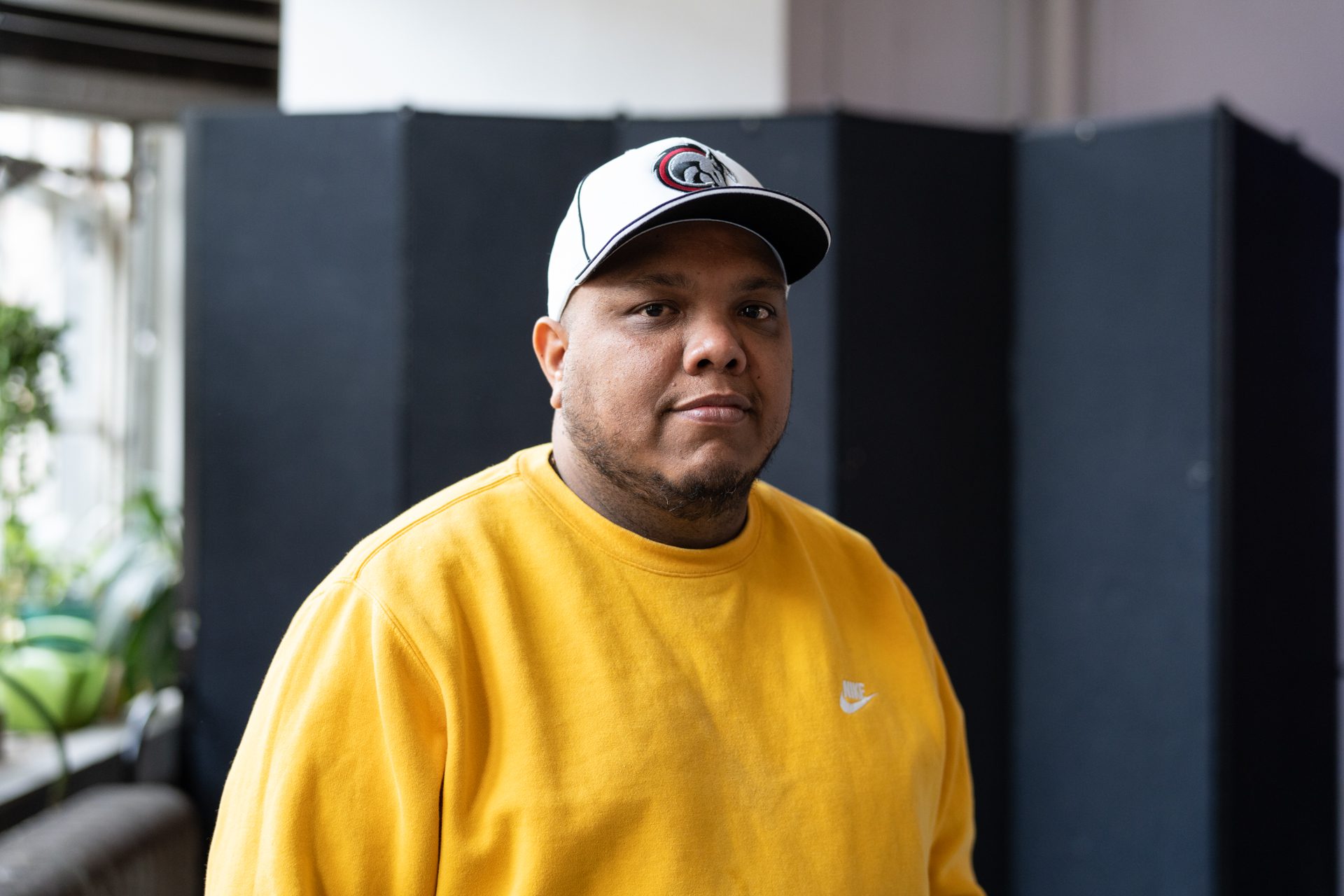 Max Herman/Borderless Magazine
Max Herman/Borderless MagazineAs new arrivals receive federal work authorization, many undocumented immigrants are stepping out of the shadows and demanding work permits after waiting for decades.
Estela Gamino watched over her children as they bounced around their gray couches inside their apartment on Chicago’s North Side.
“He just joined sports. My other daughter, she stays for…band,” Gamino said, not long after picking them up from after-school programs.
Gamino remembers not being able to participate in these programs as a child. Her mother was always working while navigating life in the United States.
News that puts power under the spotlight and communities at the center.
Sign up for our free newsletter and get updates twice a week.
“Since I had kids, I always thought: “Well, I’m gonna try to be really involved,” the 33-year-old said.
Now, the mother of six does what she can to give her children as many opportunities as possible. But her undocumented status — and her inability to work legally in the country — has made that promise a challenge.
“I feel like I’ve been proudly pushing myself so they could have a good future,” she said.”And I want them to be successful.”
As new immigrants receive federal work permits, many undocumented immigrants like Gamino, who have planted roots for generations, no longer fear stepping out of the shadows. Instead, they are galvanizing a movement that demands work permits for all immigrants.
Over the past six months, the movement has gained traction in Chicago and across the country, with longtime immigrants calling on President Joe Biden to take action that would make a lasting impact on their lives.
“I feel like we’re going to be noticed, and there might be a change,” Gamino said.
‘We deserve…a little piece of hope’
Nearly two years ago, Texas Gov. Gregg Abbott and other Republican leaders started sending migrants by bus and planes to democratic-led cities. Since August 2022, over 39,000 migrants, mostly from Venezuela, have arrived in Chicago. The political stunt came on the heels of Chicago absorbing 30,000 Ukrainian refugees following Russia’s invasion of Ukraine.
The influx of new arrivals has pressured the federal government to act. Last September, President Joe Biden’s administration expanded its work permit program, known as Temporary Protected Status, TPS, for over 470,000 Venezuelans.
In the process, the expansion of TPS prompted criticisms for failing to consider the 11 million undocumented immigrants who have been living, working, and paying taxes, all while being excluded from any benefits. An estimated 400,000 noncitizens are living in Illinois, according to Pew Research Center.
“Congress really is required to lead in this moment,” Mayor Brandon Johnson said at a recent roundtable supporting the work permit campaign. “We’re going to continue to urge President Biden to use every tool that is at his disposal to support our new arrivals and our undocumented residents.”
The president needs to “extend the same economic opportunities to our long-term undocumented brothers and sisters to further benefit our communities, to empower immigrants so they can build a better life here,” Johnson said.

The barriers to work permits and other federal programs are something that Gamino knows all too well.
In 1992, Gamino came as a child from Michoacán, Mexico. Her undocumented status has prevented her from working legally and fulfilling other goals like owning a home and giving her children a better education.
“It’s hard raising them when I want a good life for them,” Gamino said. “It’s hard for me…I feel like I have all these obstacles in front of me just because I don’t have the social [security] number.”
Gamino isn’t alone in this frustration. She’s heard similar stories from other long-time undocumented immigrants as a community navigator for the Resurrection Project, a community group advocating for work authorization.
“It’s just like madness and people [asking]: ‘Why not us?’’ she said.
Despite such frustrations, Gamino said people from across generations and mixed-status families are “joining this action” after they witnessed how swiftly President Biden expanded TPS to Venezuelans back in September.
Gamino and others have placed the responsibility for work authorization on Biden’s doorstep.
Still, she acknowledges there are limitations to the work permit program. Without a comprehensive path to citizenship, people will continue to fear that one day they may have to leave behind everything they came to nurture, Gamino said.
At least for now, a work permit is “the most important” step for undocumented people struggling to support themselves and their families, Gamino said. “I feel like we have done so much. We deserve at least a little piece of hope.”

‘A permanent kind of limbo’
Lisa Koop, National Director of Legal Services at the National Immigrant Justice Center, recognizes that TPS is not a long-term solution.
The program offers 18 months of temporary work but does not provide a pathway for permanent residency or citizenship. It doesn’t “adequately” move people to safety, protection, permanence or stability, Knoop said.
“Even when TPS is renewed for years and years, which is what we’ve seen in the context of some nationalities, it’s a permanent kind of limbo,” Koop said.
More than 470,000 Venezuelan migrants have been able to apply for work permits, but thousands more who arrived after July 31 are ineligible. In Chicago, only a small fraction of new arrivals had received work permits at the start of the year, according to CBS.
Read More of Our Coverage
The Venezuelan migrants arriving in Chicago are some of the more than seven million who have left their country since 2014 to seek asylum and escape the country’s economic crisis. Over the past 15 years, the United States sanctions against Venezuela’s government have worsened food insecurity and inflation, according to the Center for Economic and Policy Research.
Oscar A. Chacón, executive director of Alianza Americas, a nonprofit organization focused on migration education, noted the U.S. economic sanctions and security policies imposed on Venezuela had left people “with no other option but to flee away in order to save themselves.”
Outside shelters across the city, dozens of migrants have told Borderless reporters that they are looking for work to leave the shelters and build a better life for their families.
In mid-November, Pedro Barrueta arrived from Caracas, Venezuela, to the U.S. with his three children and wife in search of economic stability. They came after July 31, and are not eligible for TPS. In the meantime, they are waiting for their first asylum hearing in 2026.
Since last fall, the family has been living at Chicago’s largest migrant shelter, which has been mired in controversy amid concerns about inhumane living conditions, the death of a five-year-old boy from sepsis, and an ongoing measles outbreak.
Barrueta said his youngest son was recently sent to a nearby hospital and treated for measles. The hospital stay was the first time his son was able to sleep in a bed since arriving in the country five months ago.
“They don’t have their privacy, they don’t have their space…It’s something they long for,” Barrueta said in Spanish.

Barrueta said his son was “finally” able to get some much-needed rest. “He is calm, he is relaxed. He needs that; he’s a little boy.”
Barrueta, an air conditioner technician in Venezuela, hopes to find a job to give his family more than just a place to sleep.
“I came to this country to work; I came to this country to give my kids a better future…” he said. “I came to give them a better education and a healthier life.”
‘Waiting for decades for an opportunity’
While the move to expand work permits has been welcomed by many, some longtime immigrants have felt overlooked by the federal government.
U.S. Congressman Jesus “Chuy” Garcia, whose district in Illinois largely represents immigrants, told the AP last fall the federal expansion of work permits had created “tensions and confusion,” especially for immigrants who have waited decades for work permits or have a pathway to citizenship.
Earlier this month, Garcia and other U.S. Representatives called on President Biden to expand work authorizations and establish additional permits for undocumented spouses, Dreamers and long-term workers who have paid taxes.
“Implementing such a policy would benefit workers nationwide,” legislators said in a letter to the President. “Legal work permits would further shield immigrants from exploitation and enable them to seek jobs that match their skills, thereby fostering better working conditions.”
The humanitarian crisis has also frustrated some Black and Brown communities who have long felt the city’s systematic disinvestment in their neighborhoods. It’s been a flash point around funds spent on migrant services and shelter location at a shuttered Woodlawn school and scrapped migrant shelter in Brighton Park.
Ald. Julia Ramirez (12th), whose ward includes the scrapped migrant shelter, said many of her residents had a ‘real fear’ of whether they would be displaced by new arrivals.
Others were concerned they were being passed over for resources. People are thinking: “What about me?” Ramirez said of the frustrations.
Mayor Johnson aimed to alleviate some of those frustrations, telling residents he was committed to Chicago’s Black communities, longtime immigrants and new arrivals.
“I know that the humanitarian crises continue to test and push our city, but we cannot waiver in our commitment to the immigrant communities, and there are forces that are also looking to divide us, not under my watch. There is enough here for everyone,” Johnson said.
A young generation helps propel a movement
Outside Arturo Velazquez Institute in the Heart of Chicago, hundreds of demonstrators held signs and echoed their demands for work permits.
“¿Que queremos? ¡Permisos de trabajo!” they shouted. “What do we want? Work permits!”
Among the crowd was Ingrid, a 21-year-old student at Dominican University. Her worries overshadow her dream of becoming a history teacher because she lacks a work permit.
“I cannot be the representation my students will need if I cannot step foot into the classroom,” Ingrid said, who was two when she came to the U.S.
After many years of “bottled-up” frustrations about her undocumented status, Ingrid joined a youth group Fuerza Del Sol to advocate for federal work permits.

At the heart of her advocacy is the desire for other noncitizens to have the freedom to travel back to their home country and see their loved ones — an opportunity she never had the day her grandmother passed away three years ago.
“I was not able to attend her funeral … The last hug I have with her, I have it pictured, and it was when I was a baby, and I don’t remember that hug,” she said.
She’s often felt trapped not being able to travel to and from Mexico. But at this moment, surrounded by others, she’s hopeful.
Ingrid has urged young people “to be involved in something bigger than yourself.”
At the end of the day, “It isn’t just for us or for family and friends. It’s for millions of people. It’s for future lives.”
This article is part of the Migrant Crisis Reporting Project, made possible by a grant from Healing Illinois, an initiative of the Illinois Department of Human Services and the Field Foundation of Illinois that seeks to advance racial healing through storytelling and community collaborations.
The project is in response to the ongoing migrant crisis, which has seen over 39,000 migrants bused or flown to Chicago since August 2022.
Managed by Public Narrative, this project enlisted two local media outlets to produce impactful news coverage on the disparities and tensions within and among Chicago’s diverse communities while maintaining editorial independence.



